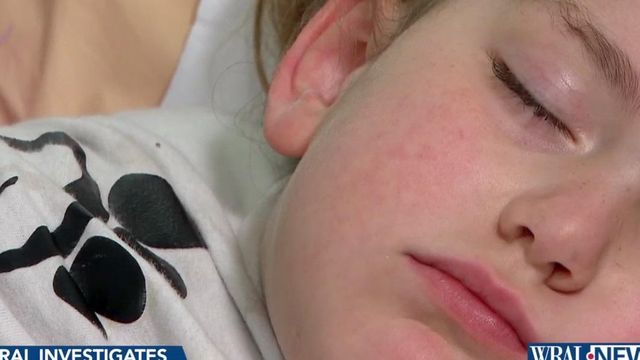NC's newborn screening fees triple amid test delays
North Carolina screens newborns for 54 disorders and genetic defects.
Last year, lawmakers added three conditions to that list and tripled the cost of newborn screenings.
The fees went up immediately, yet WRAL Investigates found that testing is still months away.
As part of the budget bill, lawmakers added Pompe Disease, Mucopolysaccharidosis Type 1 (MPS 1) and X-Linked Adrenoleukodystrophy (X-ALD) to the newborn screening protocol.
The cost of testing by the State Laboratory of Public Health jumped from $44 to $128. The bill also allows the state to raise the fee even more, if necessary, to offset the cost of the Newborn Screening Program.
Many of the conditions on the newborn screening list are treatable, but the key is catching them early.
“I would say I am disappointed to not see this happening in our state,” says Dr. Priya Kishnani, an expert in Pompe disease from Duke Health.
She’s part of a team that developed the first Food and Drug Administration approved treatment for Pompe.
Kishnani is frustrated by delay of the new testing protocol,
“If you delay a diagnosis even by a few days it can change the outcome of that baby from life versus death or the ability to walk or not walk,” she said.
Mother Kari Jacobsen knows that first-hand.
Her 4-year-old daughter, Georgia, was born in Missouri, which tested for Pompe at the time.
At five weeks of age, Georgia received the diagnosis,
“It saved her life,” says Jacobsen about the testing. “I can remember shortly after she was diagnosed just crying and sobbing because I was afraid she wasn't even going to be able to take a dance class with her sister.”
Georgia was missing the enzyme that keeps complex sugars called glycogen from threatening her heart and muscles.
Georgia now receives life-saving enzyme replacement therapy at Duke University Hospital every two weeks.
Jacobsen says the medical care is making a world of difference.
“And we saw a huge increase in her energy and mobility," she said. "She can walk, she can talk, she can do just about anything you want her to do.”
Like Kishnani, Jacobsen wants to know why North Carolina isn’t doing the testing now,
“How many children have they not screened in that nine months? It makes me sick to even think about it,” she said.
Jacobsen also wonders why North Carolina doesn’t outsource the testing until it comes up with procedures and protocol to do the tests in-state.
When Missouri first began testing for Pompe, the state sent blood samples to a lab in New York.
We requested an interview with the state Department of Health and Human Services two weeks before airing this story, but the department declined.
Instead, we received written responses about the steps that are underway to begin the new screenings.
Some of those include hiring and training staff, enhancing laboratories and gathering resources for parents whose babies test positive.
The department also defended the hike in the fee, claiming the $128 covers funding needs for all of the screening and helps make up for an ongoing budget deficit in the state lab. Two days before the story aired on WRAL News, the department sent a much more thorough response: Click here to read
“I think it's normal for parents to go ‘gosh, this feels like a long time.’ I think they're asking the right question, I just think the answer can be it takes time to set up a quality program,” says Wake County Representative Gale Adcock, who’s also a nurse practitioner. She co-sponsored the bill that led to the expansion of North Carolina’s newborn screening. WRAL Investigates contacted Adcock and informed her of the delay and the reasons provided to us by the state. Adcock immediately reached out to DHHS to get her own explanation, “I was satisfied with their answers… There's a lot of infrastructure that has to be put into place beyond just doing a test.” Adcock understands why some parents and doctors may be frustrated, but says North Carolina is on the track, “…before this law was passed there were children who were born every day, of course they were missed,” adding “But, now we have a heightened sense that we can do something about it.”
For Kishnani, the time to do something about it is now.
“Not to be able to do it in my own state, you can understand my emotion," she said.
Dr. Kishnani has a personal and professional interest in Pompe testing.
She serves on the board of a Durham company called Baebies, which provides a screening platform it promises can be in place much faster.
She points to outsourcing options used in other states as well, although state legislation instead guides DHHS to keep new testing in the state lab like it's done with other screenings for years.
Baebies Marketing Manager Emily McLoughlin said, “We’re happy to know that the state will start screening for these diseases soon and we can enable swift implementation of these new tests – even with a day’s notice. Finding the babies with these diseases is the first important step.”
Right now, the agency predicts screening for X-ALD should be ready by December, and March for the other diseases, which is more than a year-and-a-half after approval.
For parents like Jacobsen, that’s too long of a wait,
“There's always going to be bumps in the road, but since she got diagnosed early we have the capabilities to making sure she has the best life possible and I want that for every child, not just my own.”










